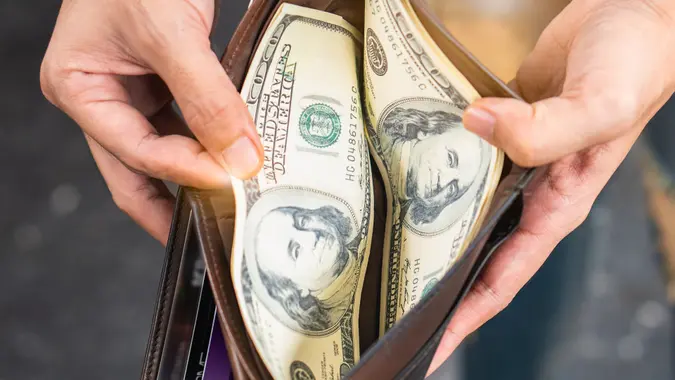7 Ways To Invest In Yourself in Your 20s

Commitment to Our Readers
GOBankingRates' editorial team is committed to bringing you unbiased reviews and information. We use data-driven methodologies to evaluate financial products and services - our reviews and ratings are not influenced by advertisers. You can read more about our editorial guidelines and our products and services review methodology.

20 Years
Helping You Live Richer

Reviewed
by Experts

Trusted by
Millions of Readers
Your 20s represent a time like no other, providing you a perfect platform for discovering what you love and investing in your future. If you’re looking for the best ways to invest in yourself in your 20s, try these tips from financial experts.
1. Your Education and Career Growth
One of the best ways to set yourself up for success in your finances and career is by investing in your education.
Although you don’t have to have a degree to be wealthy, a report from Georgetown University shows that adults with a bachelor’s degree earn an average of $2.8 million over the course of their careers — $1.2 million more than those with a high school diploma. Workers with professional degrees earned the most on average over their lifetimes at $4.7 million.
Drew Feutz, financial planner and co-founder of Migration Wealth Management, recalls how much easier it was for him to study for the CFP® exam right out of college. His colleagues who had graduated five to 10 years ago and already had families, on the other hand, had a harder time.
“Do you need a certification, license or degree to advance your career?” he said. “Knock it out now while you probably have more time and flexibility than you will in five or 10 years.”
2. Your Personal Learning
Consider supplementing your formal education with online courses and books. Training yourself to be a lifelong learner can help keep your mind fresh throughout your career.
“You probably have the most free time that you will ever have when you’re in your 20s until you get to retirement,” said Feutz. “Take the time now to read and learn about many different areas. It doesn’t have to be in your specific field of work — you will find that reading about different subjects can help you think differently and become better at your chosen profession.”
3. Your Future Personal Finances
Retirement may seem far away, but it’s never too early to start saving. The earlier you begin saving for retirement, the better, thanks to compound interest.
Samantha Hawrylack, co-founder of the personal finance blog How to Fire, recommends taking advantage of your employer’s 401(k) matching program if available. Or start your own Roth IRA and meet with a financial advisor to learn how to wisely invest in the stock market.
Your 20s are also the perfect time to start implementing important money management habits.
“Creating a budget, saving money and investing in assets such as property or stocks can help individuals secure their financial future,” said Hawrylack. “Avoiding debt and making smart financial choices can help people in their 20s avoid financial difficulties down the road.”
4. Your Network
When it comes to your career success, you may find it’s all about who you know.
“Investing in your network can be a great way to focus on your financial future as it could lead to future jobs, clients or other opportunities that you may not even be able to imagine right now,” said Feutz.
This could mean taking time to build connections on LinkedIn, paying to join career-specific networking groups in your area, or starting a group of your own.
5. Your Health
Research has long shown that how you take care of your body and mind in your 20s will have lasting effects well into middle age.
“Eating healthy foods, exercising regularly and getting enough sleep are all important for maintaining good physical health,” said Hawrylack. “Plus, practicing stress-relief techniques, setting aside time for personal growth and surrounding oneself with positive people can be extremely beneficial.”
6. A Mentor
Having a guide who is further along in their journey than you are may help shorten the learning curve and lead to better career satisfaction. In fact, 91% of workers with a career mentor say they’re happy in their jobs, according to a CNBC/SurveyMonkey Workplace Happiness Survey.
“There will be times when you need someone to talk to about a situation that you can’t speak to your boss about and that your significant other may not understand — that’s where a mentor comes into play,” said Feutz.
7. Financial or Business-Related Risks
Your 20s may be the best time to experiment — both with your finances and your career.
“Betting on yourself and starting a business or taking a job that has a low base salary but high upside in the form of equity compensation or performance payments could potentially be one of the best investments that you ever make,” said Feutz. “Or it could be one of the worst. But if you take the risk and bet on yourself in your 20s, then you have plenty of time to recover from it.”
More From GOBankingRates
 Written by
Written by  Edited by
Edited by 

























